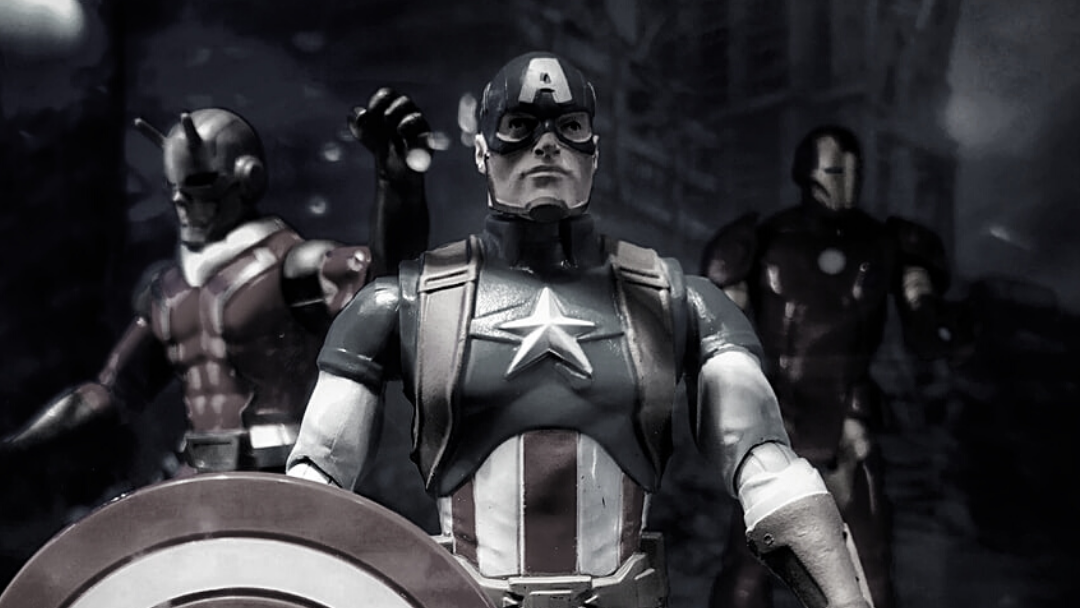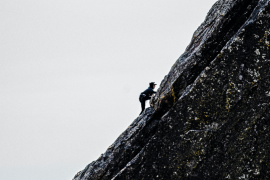BEFORE SETH GOT MARRIED AND JON-BO CHECKED HIMSELF INTO REHAB, WE USED TO JUST WANDER AROUND TOWN. We’d pop into bookstores and read comics we couldn’t afford and ignore the way the staff seemed to expect us to take things without paying for them. We’d make our way across the empty parking lots dying industries while Seth and Jon-Bo passed a vape pen back and forth and offered up cherry flavored clouds to the sky. We’d sit down curbside and stare at the passing vehicles and ask each other where we should go next. No one ever had an answer. So we kept on walking.
We were alright, you know? Not perfect, but we didn’t carry weapons and only stole from our parents. There was this sense among us, almost prophetic, that if we managed to keep breathing long enough life would eventually begin, and our fortunes would rise, and all would be well in the streets of vagrant heaven. I know I shouldn’t speak for them, but I can’t help it. I wouldn’t dare assume their thoughts now, not since they’re living in a future that’s nothing but legend to me, but when we wandered our existences were knotted together. It was the lack of a destination that unified us, not a shared one.
That evening we ended up in a fast food place—I don’t remember which, only that it didn’t have a dollar menu and that that marked the end of the world.
“Why charge the extra nineteen cents?” I said.
“Inflation,” Jon-Bo murmured. He had that distant look in his eyes that I had not yet learned the source of.
“It’s just wrong. It throws off the whole eco-system of the menu.”
“Capitalism,” Jon-Bo said, as if this explained everything.
Seth’s eyes flashed under the fluorescent lights. He turned to us, lips set in a thin line.
“So we’re not doing pizza later,” he said.
“I guess not.”
“You’re positive?”
“I don’t know, man. I didn’t even want to come into this place.”
“It’s going to affect what I get. So I’d like to know.”
We both looked to Jon-Bo for answers. He ignored us and ordered something wrapped in bacon.
*
We sat down in a booth. The local news was playing on the flat screen TV in the corner. We watched. My stomach fluid curdled at the accounted evil, and a vicious part of me, the part I kept in chains with counseling and Lexapro, spoke to me in a whispered hiss: It makes you feel good, doesn’t it. Look at you, a saint by comparison. Do you realize how disgusting that is? Do you?
“It’s sick,” I said.
Seth put down his burger. “The whole thing is unreal.”
“They won’t last long,” I said. “It’s hard to hide when you’re covered in swastikas.”
“But where did they come from? One day, everything is fine, the next there are Nazis running around. What gives?”
“They’ve always been there,” Jon-Bo said, looking up from his untouched food. “Political climate.”
We all nodded, as if this explained everything, and absolved ourselves of the issue. Or at least we tried. The stench of impotence and inaction bloomed from our wasted breath and settled around the booth, thick enough to taste, and there was no ignoring the way these toxic particles had saturated our food and our skin, but we pretended they were not there and regurgitated them over and over again, until we had finished eating.
Then we left and wandered some more.
*
Seth and I stayed close, even after his wandering ended and mine had just begun. I was there, when he traded the improvised game of make-believe we had all staked our future on for the puzzle of responsibility. This new hobby was no less difficult; but at least the pieces occasionally made sense.
His wedding—it was cosmic. The ceremony began and ended on an overlook defined by sunsets and mountains and a horizon which had no end. I danced for the first time since I was a child. I watched a woman I did not know and was afraid to approach cling to her lover, and I was content in to know that intimacy existed in the spaces above me, in the golden void I had only glimpsed at in waking dreams. I understood the pain and peace of the lapsed father, whose daughter had achieved all he could not.
The future shapeshifted. There was hope in it. It was more fantastical than any of my delusions of heroics had ever been, but here it was, in the last dance between mother and son. My heart broke. For so many years, I’d been ready to die for him. I’d have thrown myself on the pyre. I’d have lit the match. But he didn’t need a martyr; he needed allies to call on as his new journey began, and this was a journey I did not understand.
Then, a thought—whether or not it was motivated by selflessness or greed, who can say?
He’s gone beyond. But you’ll be around. As long as you keep yourself alive, you’ll be around.
I wanted to believe that; I still do.
*
We jaywalked and almost got flattened by a truck with a missing muffler and a set of oversized wheels. The truck slowed, and a man with a shaved and tattooed skull poked his head out of the passenger side window—he started shouting and making obscene hand motions and a couple of times he opened the car door as if he was going to get out, but then he’d shut it again and Jon-Bo apparently thought this was the funniest thing in the world because he started giggling. Which only made things worse.
Enter the deluge of homophobic slurs. The best thing to do was to keep on moving, so that’s what we did—at least Jon-Bo and Seth did. I stared the truck down until my friends gave me a look. The pavement vibrated, the engine revved, and the truck rocketed away, leaving snaking trails of burnt rubber behind.
“I’m getting sick of that,” I said.
Jon-Bo kept on laughing.
“I’m not joking.”
“Just let it go,” Seth said. “It doesn’t mean anything.”
But it did. Walk away enough times, and it starts to mean a whole lot.
*
I’d been drifting for a while, so Jon-Bo and I didn’t see each other, but he’d text me every so often—these notes read as if he had frantically scribbled them while trying to defuse a time bomb. I told him this once, and this was his response: I’m trying to cut the right wire, but they all look the same. Help me, man. I’m color blind.
I called him; he called me back a few years later.
He’d confided in me once that he took the occasional upper just to get through the day, and that he wanted to stop but wasn’t sure how. I hadn’t known about the heroin.
“But I’m out of it now, man,” he said. “I’ve made it. Come see.”
The place he had made it to was a large colonial house that functioned as a rehab center. It was surrounded by fields and a stable and nothing else. We met in the living area for the friends and family meeting. There was a brief group activity where all of the visitors expressed gratitude and pride or something, but I missed most of it because I couldn’t stop staring at Jon-Bo.
He’d gained weight, but his skin still looked a size too small for his skull. Before, when we weren’t strangers, his eyes had seemed nothing more than orbs of glass—now they swiveled and had substance and, more than this, they seemed to tremble at everything they saw.
During one-on-one time, we regarded each other in silence.
“Seth got married,” I said.
“Yeah. I got the invitation.”
“Jon. I’m sorry”
“Don’t.”
“I just—I should’ve reached out more. I had no idea.”
“You couldn’t have saved me. Not when I wanted to save myself.”
“I would’ve tried.”
“I know.” He shrugged, then smiled. He was missing a few teeth. “Hey. Remember the confrontation? That’s what you called it afterwards. The confrontation.”
“Of course. I almost died.”
“We should’ve gone with you.”
“No. You shouldn’t have. It was the dumbest thing I’ve ever done.”
“I get it now, though. I get your reasons. They’re the same reasons I checked in here.”
He leaned closer and reached out; his hands quivered in my own—or were mine quivering in his?
“This was the good thing to do, right?” Jon-Bo said. “I did the good thing, coming here.”
“Yeah, Jon. You did.”
His shoulders heaved forward, then back, rose and fell in spasms. He breathed out of time with his body. For a moment I had thought he was suffocating or having a seizure, but then he choked out more words. This was the first and last time I saw Jon-Bo weep.
“I made a choice,” he croaked. “I tried to make the good choice.”
“You did, Jon. You did.”
“So everything is going to be okay. In the end. Isn’t it?”
I chewed the inside of my cheek until I tasted blood.
“Isn’t it?”
He watched. He waited. I think he would’ve waited forever.
“Yeah,” I finally said. “Everything will be okay.”
We promised to keep in touch. We haven’t spoken since. I’m not sure if he’s still alive.
*
We bought a few beers which we poured into Styrofoam cups that had once held softer beverages. Seth and Jon-Bo kept on grinning, as if by disguising our drinks we had played some grand prank on the universe. We got buzzed through plastic straws and walked in zigzags under burnt out streetlights, and I knew how ridiculous it all was, I think I knew it better than either of them, but it was also right in a way. It was right that my mark of adulthood should be sloshing around in this juvenile container. I blew bubbles through my straw.
We found ourselves doing laps around a mall in which only a handful of stores had yet to go bankrupt. The whole place wasn’t going to last much longer; I knew, because I could see the stars.
“If I was a superhero I wouldn’t keep my identity a secret from my family,” Seth said. “Communication is key.”
“What if your dad or girlfriend or whatever hates heroes for some reason? What do you do then?”
“They always find out anyway—it’s better to be upfront. That way everyone has an idea what’s coming.”
Jon-Bo grunted his agreement, which meant the argument was sound. I finished my beer and crushed the cup between both hands.
“You know what I’d enjoy most about being a superhero? Having an arch-enemy.”
“You’d enjoy that?” Seth said.
“It’s like this.” I took a breath. “You’d know exactly who you’re fighting and only you could face them. There’d be no guesswork. Only clarity. Maybe you’d die, maybe you’d suffer, but there’d be clarity. Am I making sense?”
Jon Bo put his hand on my shoulder. I held my breath.
“That’s fucked up,” Jon-Bo said.
*
By the time we noticed the patrol car, it was too late—it sidled up to us, vomiting red and blue light all over the concrete, and we had no choice but to bathe in it. We’d done nothing wrong—not truly, not yet—but I mistrusted cops the same way I mistrusted doctors. I fit too neatly in the palm of their hand.
We stopped walking. Seth clutched his disguised drink as if it might float away. Jon-Bo got lost in the lights. The officer studied us for what felt like a very long time—her face strobed under the dancing colors, so I couldn’t tell if she was actually holding back laughter or if it was just some optical trick.
“Do you boys know what time it is?”
“Yes, Officer,” I said.
“You can’t be walking around here. Not now.” She paused. “We got a call about some dangerous people in this area. Please—go home.”
We nodded, expressed thanks, and got the hell out of there. But as we left the glow of the patrol car and stepped back into the night, the free pass began to stale. I made us stop on the outskirts of the mall.
“How had she known we weren’t the dangerous people?”
“Are you serious?” Seth said. “Have you seen us?”
“Nazis,” Jon-Bo said. “Bet she’s after Nazis.”
I chewed reality over. I didn’t like the way it tasted. I spat it out.
“I forgot something. I’m going back.”
“You’re kidding. And what will you do if you run into the…dangerous people.”
“I’ll face them,” I said. “We’ll face them.”
“You have to be shitting me” Seth said. “We’re not going to start a fight with a bunch of Nazis.”
“But we could.”
I turned back toward the mall; I imagined there were three distant figures approaching, outlined in darkness and ill-intent. I imagined them hollering at us, laughing, moving faster. There was a need in me to run, a need deeper than instinct, a need which still gnaws at me, but I did not know which direction would satisfy my longing—toward or away. Seth and Jon-Bo had already started moving; they looked over their shoulders at me, pleading. I turned my back to them.
“We could,” I whispered.
Like what you’re reading?
Get new stories or poetry sent to your inbox. Drop your email below to start >>>
OR grab a print issue
Stories, poems and essays in a beautifully designed magazine you can hold in your hands.
GO TO ISSUESNEW book release
I’ll Tell You a Love Story by Couri Johnson. Order the book of which Tim Jeffries said, “Surprising in their originality, filled with broken wisdom, and with a refreshing use of language and imagery, these are stories to savour and mull over one at a time but which add up to a satisfying whole.”
GET THE BOOK



